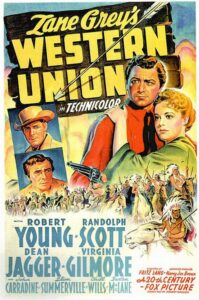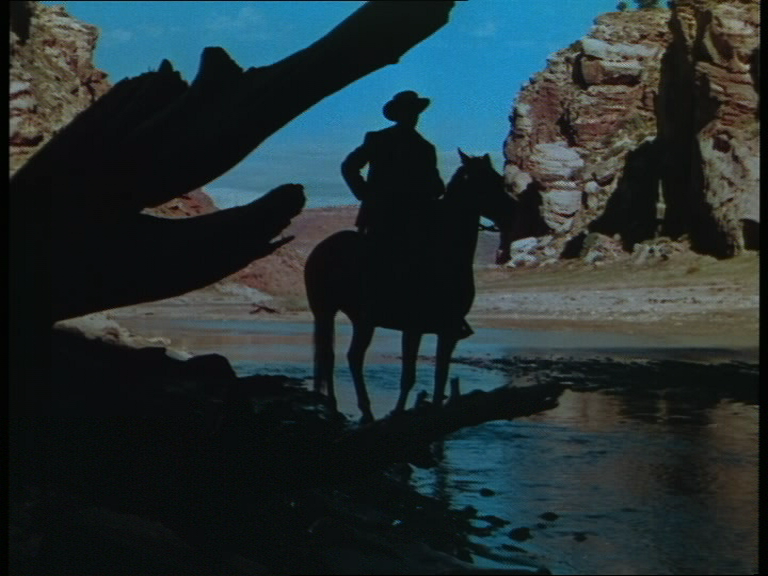“Tell him that the Great White Father who speaks with lightning over the singing wire is sorry for the wounding of his Indian son — but that the lightning talk is strong medicine, and it must go through.”
|

Synopsis:
When a former outlaw (Randolph Scott) saves the life of a Western Union engineer (Dean Jagger), he’s offered a job with the company. As they string wires across the United States, the workers must confront tribes of Indians, as well as a gang of outlaws led by Scott’s brother, Slade (Barton MacLane). Meanwhile, both Scott and an east coast dandy (Robert Young) are interested in Jagger’s beautiful sister (Virginia Gilmore).
|
|
Genres, Themes, Actors, and Directors:
- Dean Jagger Films
- Fritz Lang Films
- Native Americans
- Randolph Scott Films
- Robert Young Films
- Westerns
Review:
Few would guess that this historical western about the spread of telegraph lines across the American frontier was directed by Fritz Lang, an iconic director known primarily for his noir dramas and atmospheric visuals. Lang apparently wanted to alter the screenplay of Western Union, but was not given permission to do so; the result is a narrative which never quite rises above mediocrity, and is too often played for laughs. While Scott’s central dilemma — whether to betray his brother or not — is compelling, it’s constantly interrupted by inane subplots, particularly the underdeveloped “love triangle” between Scott, Young, and Gilmore. As in Lang’s first western (The Return of Frank James), the storyline here is almost entirely fictional; Lang himself noted that “in reality, nothing happened during the entire building of the line except that they ran out of wood for the telegraph poles, and the only other thing that disturbed the laying of the line was the ticks on the buffaloes; the buffaloes got itchy and rubbed themselves against the poles, and the poles tumbled. And that was all that happened.” Personally, I wouldn’t have minded seeing the buffaloes…
Redeeming Qualities and Moments:
- Beautiful Technicolor cinematography

- Slim Summerville responding indignantly to questions about his cooking abilities

Must See?
No, but it’s worth a look.
Links:
|



One thought on “Western Union (1941)”
First viewing. A once-must – as a solid, fictional western from director Lang, not to be taken as truth but compelling as entertainment (tinged with truth).
As always – when it comes to films ‘based on real life’ – one must look elsewhere (and sometimes several elsewheres) for what has been established as fact. I did do a tiny bit of research after watching this film. For example, it’s based on a novel by respected writer Zane Grey, but there are apparently significant differences between novel and film (as per usual). As well, the man (Jack Slade) portrayed (exceedingly well) by MacLane was a real criminal (who shows up in Mark Twain’s ‘Roughing It’). “He was hanged in the 1870s. But he did not have any involvement in stirring up Indians against railroads or telegraph companies.” (IMDb viewer comment.)
Actually, the threat that MacLane (Slade) poses to Scott – and to just about everyone in the film in general – is what gives ‘Western Union’ most of its dramatic thrust. Even if the complications aren’t true to life, they are plausible and ring true to human nature.
I don’t agree that the narrative is ‘”mediocre” (at least it wasn’t to me; I was sucked in). I also don’t think it’s “too often played for laughs” – there are some laughs, yes, but they are at a minimum (involving the cook – Slim Summerville – who dislikes being a cook). Re: the love triangle… I was actually relieved when it turned out that it wasn’t going to dominate the film; it’s a very tiny sidebar to the main action.
Even though (as noted) Lang was not allowed to alter the (surprisingly intelligent) screenplay, this feels very much like a Lang film. And it certainly looks like one. (It’s also beautifully shot.)
So, in short – this ain’t history. But it *is* a movie – a well-cast, well-acted and well-directed one. I knew almost nothing about it prior, expected just about nothing from it – and was surprised to find it worthy as fiction on a number of levels.